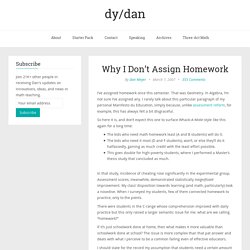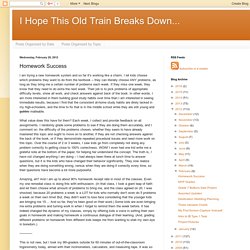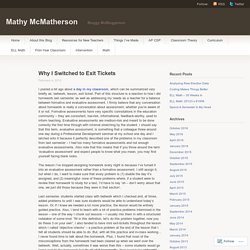

The Cult(ure) of Homework. Making Homework Matter to Students. Educational Leadership:Responding to Changing Demographics:The Case For and Against Homework. Cheesemonkey wonders: SBG, Intrinsic Motivation, and the "Grading" of "Homework" One of the surprising parts of this latest round of parent conferences was the number of parents who wanted to talk to me about why their child is suddenly interested and engaged in learning mathematics when — as I gathered — this was not previously always the case.

I teach in a district which places a very high value on school, teachers, and academic achievement, so this conversation in and of itself was not the surprising thing. I explained about using Standards-Based Grading, frequent formative assessment, and the remediation and reassessment method I first stole learned about from Sam Shah and others in my Twitterverse/blogosphere orbit, but two things came up again and again during this round of conversations which really caught me by surprise: my emphasis on in-class autonomy as a mode of differentiation and my approach to grading homework. Stop grading homework. Why I Don’t Assign Homework. I’ve assigned homework once this semester.

That was Geometry. In Algebra, I’m not sure I’ve assigned any. I rarely talk about this particular paragraph of my personal Manifesto du Education, simply because, unlike assessment reform, for example, this has always felt a bit disgraceful. So here it is, and don’t expect this one to surface Whack-A-Mole-style like this again for a long time: The kids who need math homework least (A and B students) will do it.The kids who need it most (D and F students), won’t, or else they’ll do it halfassedly, gaining as much credit with the least effort possible.This goes double for high-poverty students, where I performed a Master’s thesis study that concluded as much. In that study, incidence of cheating rose significantly in the experimental group. There were students in the C-range whose comprehension improved with daily practice but this only raised a larger semantic issue for me: what are we calling “homework?”
It was such a criminal arrangement. Yikes. I Hope This Old Train Breaks Down...: Homework Success. I am trying a new homework system and so far it's working like a charm.

I let kids choose which problems they want to do from the textbook -- they can literally choose ANY problems, as long as they bring me a certain number of problems each week. If they miss one week, they know that they need to do extra the next week. Their job is to pick problems of appropriate difficulty levels, show all work, and check answers against back of the book. In other words, I am more interested in them building good study habits over time than I am interested in seeing immediate results, because I find that the consistent at-home study habits are direly lacked in my high-schoolers, and the time to fix that is in the middle school while they are still young and gullible malleable.
What value does this have for them? Amazing, eh? This is not new, but I took my 9th-graders outside for 60 minutes of out-of-the-classroom trigonometry today, armed with their inclinometers, calculators, and measuring tape. The Truth About Homework. September 6, 2006 By Alfie Kohn Para leer este artículo en Español, haga clic aquí.

There’s something perversely fascinating about educational policies that are clearly at odds with the available data. Huge schools are still being built even though we know that students tend to fare better in smaller places that lend themselves to the creation of democratic caring communities. Many children who are failed by the academic status quo are forced to repeat a grade even though research shows that this is just about the worst course of action for them.
The dimensions of that last disparity weren’t clear to me until I began sifting through the research for a new book. In high school, some studies do find a correlation between homework and test scores (or grades), but it’s usually fairly small and it has a tendency to disappear when more sophisticated statistical controls are applied. The results of national and international exams raise further doubts. The answer is behavioral responses. Structuring Effective Homework Assignments. Homework: What Research Says. Why I Switched to Exit Tickets. I posted a bit ago about a day in my classroom, which can be summarized very briefly as: bellwork, lesson, exit ticket.

Part of this structure is a reaction to how I did homework last semester, as well as addressing my needs as a teacher for a balance between formative and evaluative assessment. I firmly believe that any conversation about homework is really a conversation about assessment, whether you’re aware of it or not. Formative assessments have very specific connotations in the education community – they are consistent, low-risk, informational, feedback-worthy, used to inform teaching. Evaluative assessments are medium-risk and meant to be done correctly the first time through with minimal stretching by the student.